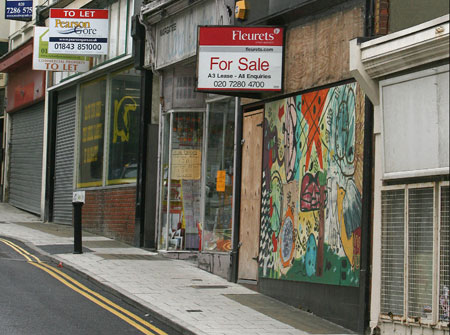New research from the British Retail Consortium (BRC) shows that more than one in ten town centre commercial properties in the UK were vacant last month. The latest statistics, which the BRC describes as alarmingly high, reveal an average vacancy rate of 11.1% with some areas of the country reporting figures of over 12%.

This represents a rise since February when a similar report put the figure at one in eight. This report also found the picture was far worse in the Midlands and the North of England with Wolverhampton and Bradford singled out as two of the most severely affected locations. While the tough economic conditions are undoubtedly a major cause of these findings is this the only reason?
The BRC doesn’t think so, and points to other factors bringing a structural change to UK high streets. Changing consumer habits in particular are having a major impact on town centres. Shopping centres, out of town developments and big supermarkets all contribute towards dwindling high street sales.
While some commercial properties such as coffee shops and pawnbrokers are thriving in town centres the report lists a series of retailers which have gone into liquidation this year including TJ Hughes, Habitat and Jane Norman. At the same time others such as Mothercare, Dixons and Thorntons are reducing their presence on the high street to focus on larger out of town stores.
The US retailer Best Buy illustrated the difficulties facing the retail sector this month, announcing that it was pulling out of the UK market completely and closing its chain of 11 stores. Some analysts believe that these trends will prevent high streets ever returning to pre-recession levels while others go further, claiming that 25% of traditional town centre commercial property is now surplus to requirement.
While structural change of this nature will require long term solutions, there are short term steps that can be taken to alleviate the current difficulties. One of the obstacles facing town centre retailers are costs particularly relating to employment and property. These are issues for central and local government but a reduction of the burden on employers and a cut in business rates might see a corresponding fall in unemployment and halt the flight from town centres.
At the same time town centres need planning, management and investment if the current trend is to be halted. Empty commercial properties serve no-one’s interest. They are unattractive to shoppers, they detract from neighbouring businesses and they blight town centres leading to fears of anti-social behaviour and crime. This is where local authorities need to be creative. If short term non-profit uses can be found it would make sense to facilitate these rather than leave shops vacant.
However, as the BRC points out, these solutions only mask the problem and it would be better still if local authorities could assist businesses in returning them to retail use. Other issues local authorities are urged to consider in order to assist town centre commercial properties are parking and access concerns.